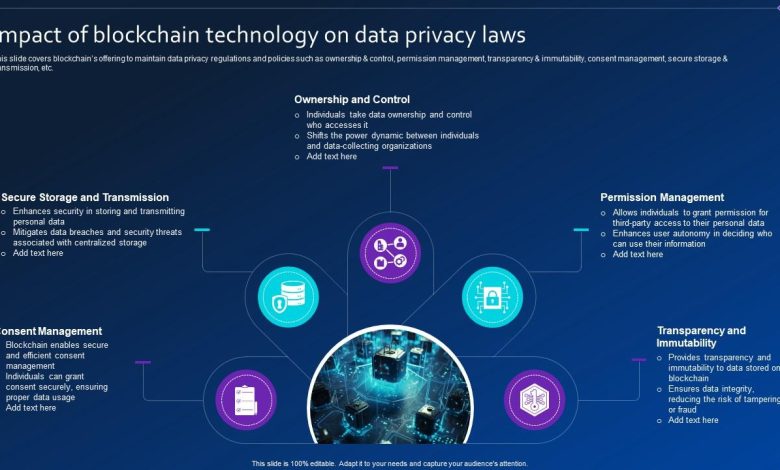The Impact of Blockchain on Data Privacy and Protection

- Understanding Blockchain Technology
- The Evolution of Data Privacy Regulations
- Challenges in Data Protection in the Digital Age
- Blockchain Solutions for Data Security
- The Role of Encryption in Blockchain
- Future Implications of Blockchain on Data Privacy
Understanding Blockchain Technology
Blockchain technology is a revolutionary innovation that has the potential to transform data privacy and protection. By utilizing a decentralized and distributed ledger system, blockchain ensures that data is securely stored and verified across a network of computers. This eliminates the need for a central authority, reducing the risk of data breaches and unauthorized access.
One of the key features of blockchain is its immutability, which means that once data is recorded on the blockchain, it cannot be altered or deleted. This provides a high level of security and integrity, making it ideal for protecting sensitive information. Additionally, blockchain uses cryptographic algorithms to encrypt data, further enhancing its security measures.
Another important aspect of blockchain technology is transparency. All transactions recorded on the blockchain are visible to all participants in the network, creating a transparent and auditable system. This transparency helps to build trust among users and ensures that data is handled in a secure and accountable manner.
Overall, blockchain technology offers a robust solution for data privacy and protection. By leveraging its decentralized nature, immutability, encryption, and transparency, blockchain can help organizations safeguard their data against cyber threats and privacy breaches. As the digital landscape continues to evolve, blockchain is poised to play a crucial role in ensuring the security and privacy of data for years to come.
The Evolution of Data Privacy Regulations
The evolution of data privacy regulations has been a crucial aspect of the digital age, with governments around the world enacting laws to protect individuals’ personal information. These regulations aim to ensure that companies handle data responsibly and transparently, safeguarding against misuse and unauthorized access. As technology continues to advance, so do the challenges in maintaining data privacy and protection.
One of the key developments in data privacy regulations is the General Data Protection Regulation (GDPR) implemented by the European Union in 2018. The GDPR sets strict guidelines for how companies collect, store, and process personal data, giving individuals more control over their information. This regulation has had a significant impact on businesses worldwide, forcing them to adapt their data handling practices to comply with the new standards.
Another important regulation is the California Consumer Privacy Act (CCPA), which came into effect in 2020. The CCPA grants California residents the right to know what personal information is being collected about them and the ability to opt out of the sale of their data. This law has paved the way for other states in the US to enact similar legislation, signaling a growing trend towards stronger data privacy protections.
As data privacy regulations continue to evolve, it is essential for businesses to stay informed and compliant to avoid hefty fines and reputational damage. The emergence of blockchain technology has offered new possibilities for enhancing data privacy and protection, providing secure and transparent ways to store and transfer information. By leveraging blockchain, companies can improve data security and build trust with their customers, ensuring compliance with the ever-changing regulatory landscape.
Challenges in Data Protection in the Digital Age
One of the major challenges in data protection in the digital age is the increasing amount of personal information being collected and stored by companies. With the rise of big data and the Internet of Things, there is a growing concern about how this data is being used and who has access to it. This has led to an increased focus on data privacy and protection regulations, such as the GDPR in Europe and the CCPA in California.
Another challenge is the constant threat of data breaches and cyber attacks. As more and more data is being stored online and in the cloud, hackers are finding new ways to exploit vulnerabilities and gain unauthorized access to sensitive information. This not only puts individuals at risk of identity theft and fraud but also undermines trust in the digital economy.
Furthermore, the lack of transparency in data collection and processing practices poses a significant challenge to data protection. Many companies are not upfront about how they collect, use, and share personal data, making it difficult for individuals to make informed decisions about their privacy. This highlights the need for greater accountability and oversight in the handling of personal information.
Blockchain Solutions for Data Security
Blockchain technology offers innovative solutions for enhancing data security in various industries. By utilizing decentralized networks and cryptographic algorithms, blockchain ensures that data stored on the network is secure and tamper-proof. This technology provides a transparent and immutable ledger that records all transactions, making it nearly impossible for unauthorized parties to alter or access sensitive information.
One of the key features of blockchain solutions for data security is the use of smart contracts. These self-executing contracts automatically enforce the terms of an agreement between parties, eliminating the need for intermediaries and reducing the risk of fraud. Smart contracts are stored on the blockchain, ensuring that all parties have access to the same information and that transactions are executed in a secure and transparent manner.
Another benefit of blockchain technology for data security is the concept of consensus mechanisms. These mechanisms require network participants to agree on the validity of transactions before they are added to the blockchain. This decentralized approach to validating transactions helps prevent data breaches and ensures that the integrity of the network is maintained.
Overall, blockchain solutions offer a robust and reliable way to protect data from unauthorized access and tampering. By leveraging the power of decentralized networks, cryptographic algorithms, smart contracts, and consensus mechanisms, organizations can enhance their data security measures and safeguard sensitive information from cyber threats.
The Role of Encryption in Blockchain
Encryption plays a crucial role in ensuring data privacy and protection within the blockchain technology. By encrypting data before it is added to the blockchain, sensitive information is secured and inaccessible to unauthorized parties. This process involves converting plaintext data into ciphertext using complex algorithms, making it extremely difficult for hackers to decipher the information.
One of the key benefits of encryption in blockchain is that it provides an additional layer of security to the decentralized network. Each block in the blockchain contains encrypted data, which is linked to the previous block through a cryptographic hash function. This ensures the integrity of the data and prevents tampering or unauthorized modifications.
Furthermore, encryption helps to maintain anonymity and confidentiality for users interacting with the blockchain. Transactions are encrypted using public and private keys, which allow users to securely send and receive data without revealing their identities. This level of privacy is essential for protecting sensitive information and preventing identity theft.
In conclusion, encryption is a fundamental component of blockchain technology that enhances data privacy and protection. By implementing robust encryption mechanisms, blockchain networks can safeguard sensitive information, maintain data integrity, and ensure user anonymity. As the importance of data security continues to grow, encryption will play an increasingly vital role in shaping the future of blockchain technology.
Future Implications of Blockchain on Data Privacy
Looking ahead, the future implications of blockchain on data privacy are significant. Blockchain technology has the potential to revolutionize the way data is stored and shared, providing a more secure and transparent system for protecting sensitive information. By utilizing cryptographic techniques and decentralized networks, blockchain can help prevent unauthorized access to data, reducing the risk of data breaches and cyber attacks.
One of the key benefits of blockchain technology is its ability to give individuals more control over their personal data. With blockchain, users can choose who has access to their information and can track any changes made to the data. This increased transparency and data integrity can help build trust between users and organizations, ultimately enhancing data privacy protection.
Furthermore, blockchain can also streamline data management processes, making it easier for organizations to comply with data privacy regulations such as the GDPR. By providing a tamper-proof record of data transactions, blockchain can simplify the auditing process and ensure that data is being handled in accordance with legal requirements.
In conclusion, the impact of blockchain on data privacy and protection is poised to be transformative. As organizations continue to explore the potential of blockchain technology, we can expect to see improvements in data security, transparency, and compliance. By leveraging the power of blockchain, we can create a more secure and privacy-centric digital ecosystem for the future.



